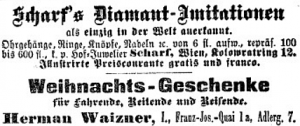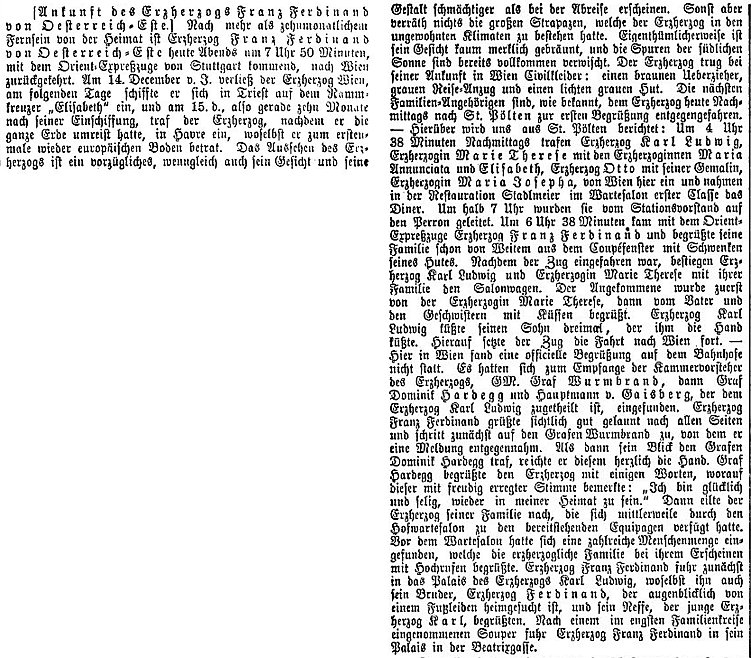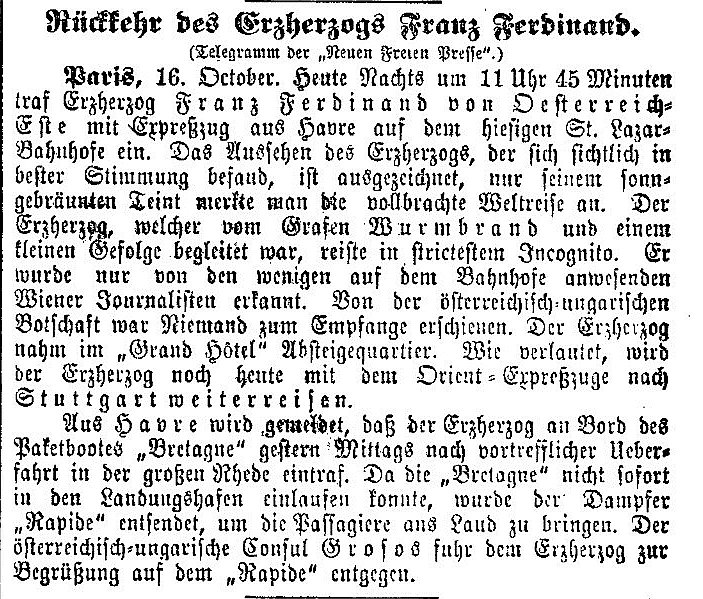Das Häusermeer Wiens versinkt am Horizont; einen letzten Gruß noch der schönen Stadt — erst nach einer langen Fahrt um die Erde soll ich sie wiedersehen!
Die Eltern, die jüngeren Schwestern, Otto und meine Schwägerin gaben mir das Geleit nach Triest. Am 14. Dezember abends trafen wir daselbst ein. Unmittelbar nach der Ankunft schiffte ich mich auf dem Rammkreuzer „Elisabeth“ ein, an dessen Bord mich der Kommandant, Linienschiffskapitän v. Becker, und der Stab empfingen. Unweit der „Elisabeth“ lag der „Greif“ vertäut. An Bord dieses Schiffes verbrachten die Eltern und Schwestern die Nacht. Heute morgens kamen die Meinen — Ferdinand war ebenfalls eingelangt — an Bord der „Elisabeth“, um noch die letzten Stunden vor der Abreise mit mir zu teilen.
Als späterhin Admiral Baron Sterneck und endlich auch Graf und Gräfin Thun, sowie Fürst Starhemberg erschienen waren, ging es an eine gründliche Besichtigung des Schiffes in allen seinen Teilen und der Ausrüstung für die lange Reise. Die Batterien, die Torpedoeinrichtungen, die kolossalen Maschinen von 9000 Pferdekräften, die riesigen 24 cm Turmgeschütze, die Offiziersmesse, sowie die Magazine mit dem Munitions- und Proviantvorrat fanden die gebührende Bewunderung.
Die letzten Stunden des Beisammenseins mit den Meinen verstrichen nur allzu rasch und nun war der Augenblick des Auseinandergehens da! Unter Geschütz- und Hurrasalut begleitete ich meine Eltern und Geschwister an Bord des „Greif“, nahm hier schweren Herzens Abschied und kehrte dann auf die „Elisabeth“ zurück. Um 2 Uhr wurde die Vertäuung gelöst; die Volkshymne erklang, hundertstimmig erbrausten Hurrahs der Offiziere und Matrosen — majestätisch setzte sich die „Elisabeth“ in Bewegung. Wir fuhren neben dem „Greif“ und zwei mit Damen, Offizieren und anderen Herren aus Triest dicht besetzten Lloyddampfern — „Arciduchessa Carlotta“ und „Danubio“ — vorbei. Auf sämtlichen Schiffen ertönte die Volkshymne; grüßend wurden Tücher, Mützen, Hüte geschwenkt; in allen möglichen Sprachen erschollen zu uns herüber die Rufe „Auf Wiedersehen“ und „Glückliche Reise“, die wir mit „Hurrah“ und Flaggengruß erwiderten. Es war ein ergreifender Moment!
Der Tender „Büffel“, die beiden Lloyddampfer und der „Greif“ schlossen sich uns zur Begleitung an. Unsere beiden Bordkapellen brachten patriotische Färbung in die Abschiedsstimmung — die Weisen des Radetzky- und des Prinz Eugen-Marsches, das herrliche „0, du mein Österreich“ erklangen über die See. Die Heimat schien uns die Erinnerung an ein prachtvolles Bild einprägen zu wollen; denn aus heiterem Firmament strahlte die Sonne glänzend nieder, sich spiegelnd in der tiefblauen, glatten Adria, und aus der Ferne grüßten mit ihren leuchtenden Häuptern die schneebedeckten Berge.
Doch einmal muss geschieden sein! Einige Meilen von Triest entfernt, auf der Höhe von Pirano, signalisierte der „Greif“ am Masttop „Glückliche Reise, Lebewohl und Waidmannsheil“, dann schwenkte er scharf steuerbord ab; ein letzter Gruß noch von der Kommandobrücke und wir steuerten mit südlichem Kurs allein in die Ferne. Lange blickte ich dem „Greif“ nach. Die Entfernung wuchs; das dem heimatlichen Hafen zusteuernde Schiff ward immer kleiner und
kleiner, bis es wie ein Punkt am Horizont schwamm, dort, wo Himmel und Wasser ineinanderzufließen schienen. Dann entschwand es völlig meinen Blicken. In mein Inneres aber senkte sich ein Gefühl unendlicher Sehnsucht nach der Heimat und den Lieben, die sie mir birgt — es war Heimweh, das ich früher nicht gekannt. Eben erst hatte mich die Reiselust mit ihrem ganzen Zauber erfasst und nun, wenige Augenblicke nachdem ich den heimatlichen Boden, Eltern und Geschwister verlassen, war schon Heimweh, der treue Gefährte des an seiner Scholle hängenden Reisenden, an meiner Seite erschienen, unwillkürlich herbeigerufen durch den Gedanken, dass ich ein Jahr lang in der Ferne weilen soll.
Nie habe ich die Macht, welche das Vaterland auf seine Söhne zu üben vermag, tiefer empfunden als jetzt, da ich in jeder Sekunde mich unaufhaltsam von ihm entfernte. Trostreich aber überkam mich auch das Bewusstsein, dass Entfernung nicht Trennung bedeutet; denn jene wird überbrückt durch die Hoffnung auf glückliche Rückkehr aus der Fremde, auf freudiges Wiedersehen. Willig überließ ich mich einige Zeit meiner Stimmung und hing den Gedanken nach, die sie erzeugte. Dann aber bannte ich dieselben. Galt es ja doch zunächst für jeden von uns, sich auf dem schwimmenden Stücke Vaterland so wohnlich und behaglich als möglich einzurichten. In den Kabinen wurden Photographien und Bilder aufgehängt, die Bücher der reichhaltigen Reisebibliothek geordnet, Waffen ausgepackt und instandgesetzt. Bald war die Arbeit getan und ich ging wieder auf Deck. Die wohlbekannte Istrianer Küste mit ihren kahlen Felsen und den netten, weißen Ortschaften zog an uns vorbei; fernhin erglänzte noch der Gipfel des Monte Maggiore. Ein prachtvoller Sonnenuntergang beschloss den Tag. Der Abend vereinigte uns in der Speisekabine und die sinkende Nacht fand uns noch bei der Abfassung der ersten brieflichen Grüße an die Heimat.
Links
- Ort: Triest (Italien).
- ANNO – am 15.12.1892 in Österreichs Presse
- Das Wiener K.k. Burgtheater spielt Ludwig Fuldas neues Stück „Das verlorene Paradies“ und das K.k. Hof-Operntheater führt Richard Wagners Tristan und Isolde auf.



